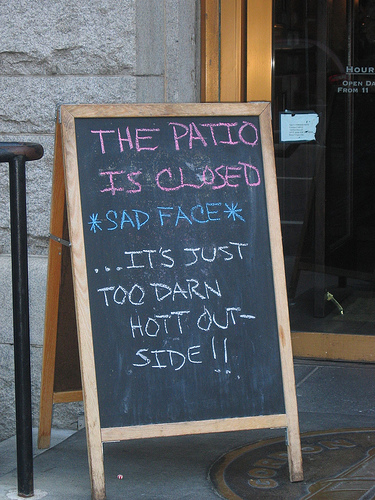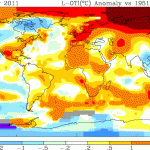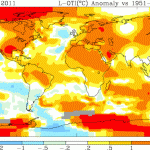
Last summer, it was hotter than hell in Texas. We nearly broke the all-time record for most consecutive days over 100F. We missed it by a mere one day, which – as far as I am concerned – is a statistical fluke. Remember that the winter of 2011 was termed “Snowpocalypse,” and less-responsible media outlets were calling it the “end of climate change.” They seemed, back then, to have missed the meaning of the word “change.” Global climate disruption, a more accurate phrase that describes the whole phenomenon, is expected to cause the extremes of cold and hot to grow more extreme, while also accompanied by an increased frequency of extreme phenomena. Such phenomena would include blizzards (due to the increased concentration of water vapor in the air), hurricanes, tornadoes, and thunderstorms, as well as droughts.
The summer of 2011 was the hot answer to the winter “Snowpocalypse.” Both of these were phenomena in-line with the predictions of human-induced climate disruption. I thought it would be useful to once again review the NASA GISS data, satellite temperature data collected routinely by NASA and made publicly available for viewing [1].
Last year, in a post entitled “Revisiting the end of climate change,” [2] I discussed the buzz over the extreme snow of the winter of 2011 and the extreme drought of the summer of 2011. At the time, I did not have access to the full 2011 summer of data from the NASA GISS satellite. However, now that more than a year has passed we can easily get the temperature data from 2011 and compare to the average of temperatures from 1951-1980 (a typical period from which climatologists take a running average in order to compare historical temperatures).
The maps for the springs (March-May) of 2011 and 2012 are below (top row). We can see (top row, left) that the U.S. and Europe both experienced average temperatures in Spring, 2011, that were almost 4F HIGHER than the average of 1950-1981. Similarly, we can see the temperature data from the same period in 2012 and in the same scale (temperature relative to the average between 1951-1980). Worse, the high temperatures now spread MUCH further across the U.S. Nearly the entire U.S. experienced spring temperatures that were 1-4F HIGHER than the average between 1951-1980. This is backed up by other data from NOAA, which reports that tens of thousands of temperature records have been broken across the U.S. in 2012 [3]. All of this is consistent with the patterns predicted by climatologists looking at the trends in temperature, moisture, and climate.
We can then look at last summer’s (June-August) temperature data and compare to the numbers from June of this year (bottom row). Again, the trend is clear. Last summer (bottom left), the heat wave was mostly contained in the South and Southwest of the U.S.; this year, it’s more widespread (at least, as of June).
Water use has become a larger issue in the Southwest. Jodi and I installed a rain barrel in the spring so that we could store rainfall water for use on non-eating plants in our yard (flowers, vines, shrubs, etc.). The water restrictions are still in place in Texas, and we wanted to stay ahead of the restrictions by stockpiling water. This has worked really well; better than expected, in fact. We actually don’t have enough storage capacity for the amount of spring rainfall we received, so we plan to expand water storage as we can afford to.
I wish we had the money to do something about our A/C. For instance, I’d love to run the water condenser drain, not to the sink drain (its current target), but to the water barrels outside. I’d also like to power the A/C by other means, such as batteries fed by solar panels. But Texas is not quite there yet on accepting such technology in residential settings, and we don’t have money for a legal fight.
Will next year be hotter? Who can say? Money is good that it won’t get suddenly cooler, although statistically that could happen (there is always a chance for a temperature fluctuation in a given year… that’s why weather is not the same as climate). We’re erring on the side of trying to increase conservation. Since President Obama has foregone leadership on the climate issue, something for which I am not ready to forgive him, it seems like it’s up to ordinary citizens to set policy in their homes until a national policy can be written to help offset greenhouse gas pollution.
[1] http://data.giss.nasa.gov/gistemp/maps/
[2] http://steve.cooleysekula.net/blog/2011/07/23/revisiting-the-end-of-global-climate-change/
[3] http://www.csmonitor.com/Science/2012/0703/Why-has-2012-been-the-hottest-year-on-record-in-the-US










